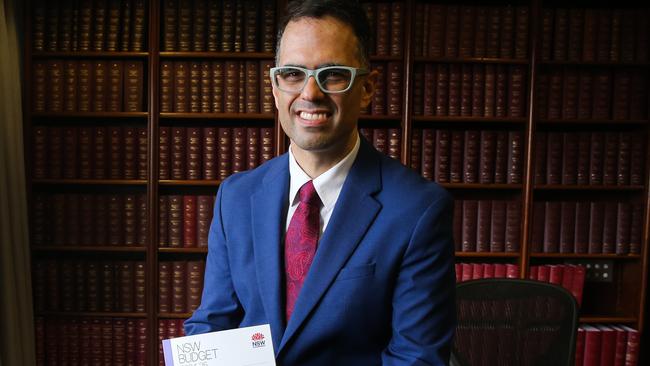‘Rip-off’ on GST to keep NSW in the red
The NSW purse strings will remain in billion-dollar deficits until at least 2027-28 as Treasurer Daniel Mookhey continues to blame a ‘GST rip-off’ ahead of handing down Tuesday’s budget.

The NSW purse strings will remain in billion-dollar deficits until at least 2027-28 as Treasurer Daniel Mookhey continues to blame a “GST rip-off” ahead of handing down Tuesday’s budget.
The deterioration in the budget bottom line includes about $1.7bn lost from the Commonwealth Grants Commission carve-up of GST revenue; a $1bn 2018 accounting error; and about $1.3bn in other changes to spending, revenue and economic parameters.
The Treasurer will reveal that the state will be in deficit for the foreseeable future, a fact he blamed on the GST carve-up, which Treasury estimates will cost the state $11.9bn over four years.
“If NSW was still getting back 92c from every dollar in GST paid in the state, the budget would be returning to surplus next year,” Mr Mookhey will tell parliament. “In fact, NSW could have expected cumulative surpluses over the forward estimates worth $1.9bn.”
The deficit has fallen from $9.7bn in 2023-24 to $3.6bn in 2024-25, and is now estimated at $2.5bn and $2.4bn in 2025-26 and 2026-27 respectively.
In 2027-28, it is anticipated to have fallen to $1.5bn, which, the Treasurer will say is an overall $8.6bn improvement from the 2022-23 budget.
In December’s half-yearly review, the government was still forecasting a $475m surplus for 2024-25, before it took the new GST carve-up into account.
The $1bn error pertains to what Mr Mookhey has called a “serious accounting error” when, in 2018-19, sales of buildings above Sydney Metro stations were wrongly accounted for twice in the budget. It has been under-reported for the five years since.
It is the GST carve-up, however, that Mr Mookhey has long aimed his criticism at, calling it “absurd”. NSW will receive only 86.7c in the dollar from GST revenue per person in 2024-25, compared with 92.4c in the dollar in 2023-24, a 6 per cent decline and a record reduction.
“The Grants Commission has cost NSW more in lost revenue than Covid did,” Mr Mookhey will tell parliament.
He will say that, given the cost-of-living crisis, the government has “absorbed” the $11.9bn cut and it would refuse to impose austerity measures, saying it would “lead to misery”.
The GST revenue under the decision by the Grants Commission was much lower than had been assumed by the Treasury, which under a relatively new Labor government is struggling to reduce costs and pay down debt in the wake of huge deficits from the pandemic.
Mr Mookhey has called for an overhaul of the GST distribution formula to a more transparent per capita model that he says is fairer and will deliver greater certainty to state governments.
The budget is also very unlikely to include the handouts seen in Queensland’s budget last week, and unlikely to contain any major announcements that have not already been revealed.
Housing, one of the government’s key policy packages, is expected to be central to the budget, particularly affordable and social.
Funding announced so far includes $8.4m to establish the NSW Rental Taskforce, $450m to build more than 400 build-to-rent homes over the next three years, and $3.6bn in school infrastructure across western Sydney, including two new schools in Box Hill.
On transport, $91m in funding has been allocated to overhaul NSW’s bus network, $447m to life-extend the Tangara trains, $2bn for the second stage of the Parramatta Light Rail, and $1bn for roads around the Western Sydney Airport precinct.
NSW has also scrapped annual indexation on land tax rates, instead freezing the tax-free threshold for land tax at the 2024 level of $1.075m.
The change is forecast to add $1.68bn to the state’s bottom line over the next four years, with the funds slated to go towards building new homes.
The tax applies to holiday homes, investment and commercial properties, but not primary residential homes and farms.
In May, the government and Origin Energy brokered a deal to extend the Eraring coal-fired power station to mid-2027, with the former potentially paying up to $450m if the plant runs at a loss under a potential underwriting agreement.
But NSW could gain up to $40m a year if Origin profits from the continued operation of Eraring.




To join the conversation, please log in. Don't have an account? Register
Join the conversation, you are commenting as Logout